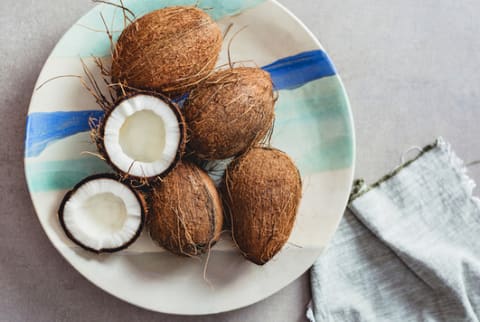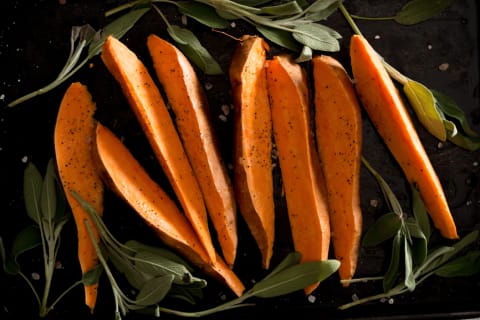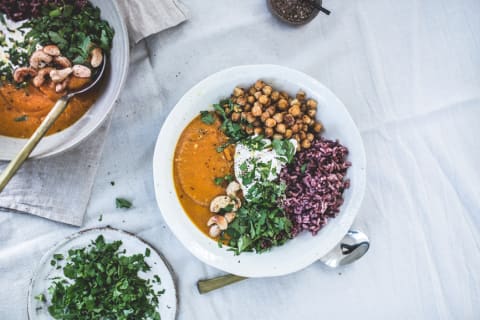Advertisement
Why The Founder Of Whole Foods Market Thinks Coconut Oil Is Worse For You Than Sugar


The founder of Whole Foods Market, John Mackey, has changed the way we eat in the US. He’s responsible for millions of people having easy access to healthier food, and has introduced new ratings that bring exposure to the health benefits of produce, and the ethics and environmental practices behind meat products. He stopped by mbg’s Brooklyn office to talk about his new book, The Whole Foods Diet: The Lifesaving Plan for Health and Longevity, what he eats for breakfast, the best way to spend $20 at Whole Foods, the so-called healthy food that he thinks people should be avoiding. Here’s what he had to say!
How would you define your personal diet?
I'm eating a whole foods diet. There are two rules to the whole foods diet: You should eat real foods, not a bunch of refined foods or processed foods. Lots of fruits and vegetables, beans, whole grains, nuts, and seeds. I'm 100 percent plant-based, but we think, from a health standpoint, you're OK until you get above 10 percent animal foods, and then your risk for heart disease and cancer starts to go up. I'm plant-based for ethical reasons, and I have been for about 14 years.
How has eating healthier changed your life?
I felt better when I became a vegan, but I'd been a vegan for two or three years before I read the China Study, and once I got refined foods out of my diet, and got oil out of my diet, my weight came down. I weigh the same as I did when I was 18, I rarely get a cold—and I live a pretty stressful life, running a huge company and traveling all the time.
What do you eat for breakfast?
I do one of two breakfasts. When I travel, I bring a mini rice cooker. I bring unsweetened steel-cut oats and almond milk, and that'll do in a pinch. If I can get to Whole Foods, I'll pick up some berries to go on top. When I'm at home, I make a smoothie with whatever fruit is in season, a lot of greens (I rotate spinach, kale, arugula, collard greens, and dandelion), flaxseeds, fresh turmeric, and fresh ginger.
What's your No. 1 appliance that you recommend healthy cooks have in their kitchen?
No. 1 has to be a Vitamix, but No. 2 is a little less known—a steam oven. We use it instead of a microwave. You just cut up your veggies, put them in, and in 10 minutes you have perfectly steamed veggies. I make a little nut sauce in the Vitamix, and then dinner is good to go.
What is the healthiest thing you can buy at Whole Foods Market?
Without a doubt, you should do your primary shopping in the produce department. They have the most nutrient density per calorie. If I were to choose one, I'd choose sweet potatoes, because they have everything you need. You can live on sweet potatoes. The Okinawans, who are renowned for living among the longest in the world, something like 70 percent of their calories come from sweet potatoes.

What's your favorite thing you can buy at Whole Foods Market?
I'm a bean freak. I love beans. I've never had a bean I don't like. I buy them dry. I especially love all of the heirloom beans that are available right now—they're really fantastic. I soak them overnight and cook them in a pressure cooker.
What's the best diet advice you've ever gotten?
Eat real, whole foods. The best definition I've heard of what a whole food is: "Nothing bad has been added, and nothing good has been taken away." So you take steel-cut oats; they're clearly technically processed from the original plant. But nothing bad has been added, and they still have all that fiber—nothing good has been taken away. But if you take oatmeal cookies, something bad has been added, so it's no longer a whole food.
Whole Foods Market sells a lot of packaged products, like organic cookies and chips. Considering your philosophy on real, whole foods, where do those fit in?
I think we have healthier alternatives. If you want to eat cookies, you're better off eating our cookies. But if you eat mostly those foods, you're not going to achieve your best health potential.
If you were going to eat a packaged, convenience food, what would you eat?
I would eat corn thins. They're like rice cakes, but they're made out of corn. It is processed, because they add a little salt to it, but it's not too bad. I'd use it as a substitute for anything I'd use chips for, to dip in hummus, baba ganoush, or anything like that.
What do you think is the best way to spend $20 at Whole Foods Market?
I would tell people to buy several meals they could base around starch foods, like some kind of brown rice, legume, or sweet potatoes. And then I would say, buy the seasonal vegetables. That'll be your healthiest, most economical diet. They're a bit more expensive, but if you can throw some nuts and seeds on there, you're basically good to go.

Are there trends in the food world that you feel are overrated?
I think low-carb/paleo is super overrated. I think there are some healthy aspects to it—if you take someone who has been eating the standard American diet, and they start eating paleo, they're going to feel great. They've cut out the sugar and the white flour and they're replacing all of that with whole fruits and vegetables. But they tell you not to eat beans and whole grains, which are so associated with longevity, and they eat a lot more meat, and in the long term, eating massive quantities of animal food correlates with cancer and shortened lives.
What's the unhealthiest thing you eat?
I have this dessert I make when I entertain, and it's so delicious. You take avocado, a bit of unsweetened non-dairy milk, pitted medjool dates, organic cocoa powder, a little bit of vanilla extract, and blend it all up. It makes a chocolate pudding that is so good—especially if you put some blueberries on top. I don't really eat candy or anything like that. I've actually become very conscious of the fact that if someone sees me chowing down on some junk food, it'll be all over the place.
What so-called healthy food do you think is actually unhealthy?
Oil. I don't think oil is at all good for you—even oils like avocado or coconut oil. The way I try to get people to understand oil is: What is sugar? You're taking a whole plant food, and you're taking only the carbohydrate out. Oil is the same thing—you're taking the whole plant food, and taking out just the fat. People are so willing to condemn sugar, but they don't condemn oil, which is pure fat. I'd actually argue that oil is less healthy than sugar. Neither of them has any nutrients in them—if you look at them they're devoid of minerals and phytonutrients. The oil has twice the calories of sugar, so you're getting twice the calories of sugar, with no nutrients or benefits.